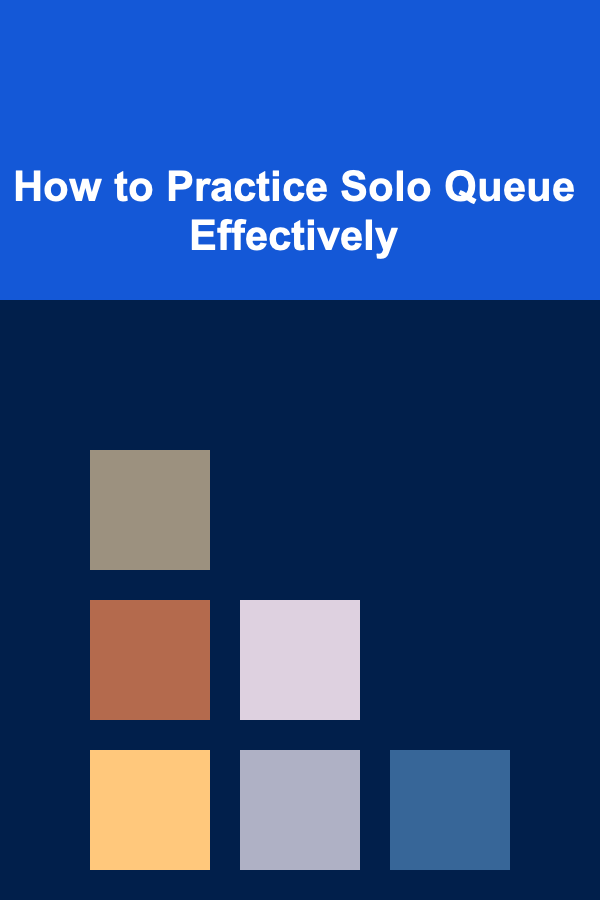
How to Practice Solo Queue Effectively
ebook include PDF & Audio bundle (Micro Guide)
$12.99$6.99
Limited Time Offer! Order within the next:

Introduction: Solo Queue - A Breeding Ground for Improvement
Solo queue, the unranked or ranked mode where individuals queue up alone to be matched with and against other players, is often perceived as a chaotic and frustrating experience. However, for dedicated players seeking to improve their skills and climb the ranks, solo queue represents a crucial testing ground and an invaluable opportunity for growth. This isn't simply about grinding out games; it's about practicing effectively, focusing on specific aspects of your gameplay, and using each match as a learning experience. The key is to shift your mindset from solely focusing on winning to maximizing your personal development within the competitive environment.
Many players treat solo queue as a random series of games, leading to inconsistent results and a lack of tangible improvement. This guide aims to provide a structured approach to practicing solo queue, covering key aspects such as mindset, champion selection, macro game awareness, mechanical skill refinement, review processes, and mental fortitude. By implementing these strategies, you can transform your solo queue experience from a frustrating grind into a powerful training ground for becoming a better player.
Before we dive in, it's important to understand that effective solo queue practice isn't a magic bullet. It requires consistent effort, honest self-assessment, and a willingness to adapt and learn. The goal is to develop a sustainable and personalized practice routine that addresses your specific weaknesses and leverages your strengths.
I. The Right Mindset: Setting the Stage for Success
Your mindset is the foundation of your practice. A negative or tilted mindset will actively hinder your ability to learn and improve. Here are key aspects of cultivating a productive mindset:
- Focus on Improvement, Not Just Winning: Winning is a desirable outcome, but it shouldn't be your primary focus during practice. Instead, set specific goals for each game, such as improving your CS per minute, warding more effectively, or practicing a specific champion combo. Even in losses, you can achieve these goals and gain valuable experience. This shift in perspective reduces tilt and allows you to learn from mistakes without getting discouraged by the outcome.
- Embrace Mistakes as Learning Opportunities: Mistakes are inevitable. Instead of getting angry or blaming others, analyze what went wrong and how you can avoid similar errors in the future. Record your gameplay and review it later, focusing on your decision-making process. Ask yourself: "Why did I make that decision? What were the potential consequences? Could I have done something differently?"
- Control What You Can Control: You can't control your teammates, the enemy team's picks, or even random events within the game. Focus on the aspects you can control: your own performance, your decision-making, your communication, and your attitude. Don't waste energy getting frustrated by things outside of your control. Instead, focus on maximizing your own impact on the game.
- Stay Positive and Constructive: Tilt is a major enemy of effective practice. If you find yourself getting frustrated, take a break, do something to relax, and come back with a fresh perspective. Avoid blaming your teammates or engaging in toxic behavior. Instead, focus on positive communication and constructive feedback, even if it's just encouraging your team. Remember, a positive attitude can actually influence your team's performance for the better.
- Treat Every Game as a Learning Experience: Even seemingly "easy" wins can offer opportunities for improvement. Did you snowball effectively? Could you have closed out the game faster? Did you identify and punish the enemy team's mistakes? Don't become complacent just because you're winning.
II. Champion Selection: Strategic Picks for Focused Practice
Your champion pool and selection process significantly impact the effectiveness of your solo queue practice. Randomly picking champions or playing whatever is "meta" isn't an optimal strategy. Consider these factors when choosing champions:
- Focus on a Small Champion Pool: Mastering a few champions is far more effective than being mediocre with many. Choose 2-3 champions per role that you enjoy playing and that fit your playstyle. Focus on understanding their strengths, weaknesses, matchups, and optimal builds. This allows you to concentrate on refining your mechanics and decision-making on those champions, rather than constantly learning new abilities and strategies.
- Choose Champions That Align With Your Goals: Are you trying to improve your early game aggression? Pick a champion that excels in early skirmishes. Do you want to practice your late-game scaling? Choose a champion that becomes a powerhouse in the late game. Select champions that allow you to specifically practice the skills you want to develop.
- Consider Your Team Composition: While you shouldn't always pick what your team needs (especially if it forces you onto a champion you're uncomfortable with), try to be mindful of your team's overall composition. If your team lacks engage, consider picking a champion with strong initiation. If your team is all-AD, consider picking an AP champion to diversify your damage output. This demonstrates adaptability and promotes teamwork, which are valuable skills in solo queue.
- Learn Counterpicks, But Don't Rely on Them Exclusively: Understanding counterpicks is important, but don't automatically pick a counter if you're not comfortable playing the champion. It's better to play a champion you know well, even in a disadvantageous matchup, than to play a counterpick you're unfamiliar with. Use counterpicks sparingly, focusing on matchups where you can realistically exploit the enemy's weaknesses.
- Drafting Tools and Resources: Utilize resources like op.gg, u.gg, and Mobalytics to analyze champion win rates, pick rates, and counter matchups. While these sites shouldn't dictate your picks entirely, they offer valuable insights into the current meta and can help you make informed decisions.
III. Macro Game Awareness: Strategic Decision-Making Beyond the Lane
Macro game, or macro play, refers to the strategic decisions you make outside of individual lane matchups. It's about understanding the overall game state, objectives, and how to position yourself and your team for success. Improving your macro game is crucial for climbing in solo queue, as it allows you to translate individual advantages into team-wide victories.
- Objective Control: Pay attention to the timers on dragons, Rift Herald, and Baron Nashor. Coordinate with your team to secure these objectives, as they provide significant advantages. Understand which objectives are most important at different stages of the game and prioritize accordingly. For example, early dragons are valuable for snowballing a lead, while Baron Nashor is crucial for closing out the game.
- Warding and Vision Control: Warding is essential for map awareness and preventing ganks. Place wards in strategic locations, such as river bushes, jungle entrances, and enemy camps. Clear enemy wards to deny them vision. Pay attention to the minimap and use the information to make informed decisions. Investing in control wards is crucial, as they provide vision and deny enemy vision simultaneously.
- Lane Management and Wave Control: Learn how to manipulate minion waves to your advantage. Freeze the wave near your tower to deny the enemy farm. Push the wave to pressure the enemy tower or roam to other lanes. Slow push a wave to set up a favorable trade. Understanding wave management allows you to control the flow of the game and create opportunities for your team.
- Rotation and Roaming: Recognize when it's appropriate to rotate to other lanes to help your teammates. If your lane is pushed or you're ahead, consider roaming to assist a struggling teammate or secure an objective. Communicate your intentions with your team to avoid unnecessary deaths or wasted time.
- Teamfighting and Positioning: Understand your role in teamfights and position yourself accordingly. Tanks should engage and soak up damage. Carries should stay safe and deal damage from the backline. Supports should protect their carries and provide utility. Pay attention to the enemy team's positioning and exploit their weaknesses. Knowing when to engage, disengage, or peel for your teammates is crucial for winning teamfights.
- Tracking the Jungler: Knowing the enemy jungler's location is crucial for avoiding ganks and making informed decisions. Pay attention to when the jungler is visible on the minimap and try to infer their pathing. Communicate this information to your teammates to warn them of potential ganks. Warding key jungle entrances can also help you track the jungler's movements.
IV. Mechanical Skill Refinement: Honing Your In-Game Execution
Mechanical skill refers to your ability to execute actions precisely and efficiently in the game. This includes things like last hitting, trading, kiting, and using abilities effectively. While mechanical skill isn't everything, it's an important foundation for higher-level gameplay.
- Last Hitting Practice: Consistent last hitting is essential for maximizing your gold income. Practice last hitting in custom games or practice tool until you can consistently achieve high CS scores. Focus on timing your auto attacks and using abilities to secure last hits. Learn to last hit under tower pressure and in contested lanes.
- Trading Stance and Auto-Spacing: Learn how to trade effectively in lane by understanding your champion's range and damage output. Use auto-spacing to harass the enemy while minimizing your own risk. Pay attention to minion aggro and avoid taking unnecessary damage. Practice trading in different matchups to learn your strengths and weaknesses.
- Kiting Techniques: Kiting is the ability to move between auto attacks, allowing you to deal damage while staying safe from enemy attacks. Practice kiting in custom games or practice tool using attack-move commands. Learn how to kite effectively against different types of enemies, such as melee champions and ranged champions.
- Combo Execution: Master the combos for your chosen champions. Practice the combos in practice tool until you can execute them consistently and efficiently. Learn the optimal order of abilities for different situations. Consider the use of Flash to extend your combo range or surprise your opponents.
- Animation Cancelling: Many champions have animations that can be cancelled to speed up their combos or increase their damage output. Learn which animations can be cancelled on your chosen champions and practice the techniques in practice tool. Animation cancelling can significantly improve your mechanical skill and allow you to outplay your opponents.
V. The Review Process: Analyzing and Learning from Your Games
Reviewing your games is a critical step in the improvement process. It allows you to identify mistakes, analyze your decision-making, and track your progress. Without review, you're essentially repeating the same mistakes without realizing it.
- Record Your Gameplay: Use a screen recording software (like OBS Studio, Nvidia Shadowplay, or AMD ReLive) to record your gameplay. This allows you to review your games later and analyze your performance. Make sure to record both video and audio, so you can hear your communication with your team.
- Focus on Decision-Making: When reviewing your games, pay close attention to your decision-making process. Ask yourself: "Why did I make that decision? What were the potential consequences? Could I have done something differently?" Identify the mistakes you made and think about how you can avoid similar errors in the future.
- Analyze Your Macro Play: Review your macro decisions, such as objective control, warding, lane management, and rotation. Did you make the right calls? Could you have positioned yourself better? Did you capitalize on opportunities? Identify areas where you can improve your macro game.
- Examine Your Mechanical Skill: Review your mechanical execution in key moments, such as teamfights and skirmishes. Did you execute your combos correctly? Did you kite effectively? Did you miss any important skillshots? Identify areas where you can improve your mechanical skill.
- Utilize Replay Tools: Use the in-game replay system or third-party replay tools to analyze your games from different perspectives. Watch your own gameplay from the perspective of your teammates or your opponents. This can give you new insights into your mistakes and help you identify opportunities you missed.
- Seek Feedback: Share your replays with higher-ranked players or coaches and ask for feedback. An outside perspective can often identify mistakes and areas for improvement that you might have missed. Be open to constructive criticism and use it to refine your gameplay.
VI. Mental Fortitude: Maintaining Consistency and Resilience
Mental fortitude is the ability to stay focused, positive, and resilient in the face of adversity. It's crucial for long-term success in solo queue, as it allows you to maintain consistency and bounce back from setbacks. Tilt, frustration, and negativity can all hinder your performance and prevent you from improving.
- Manage Tilt: Tilt is a state of emotional frustration that can negatively impact your gameplay. Recognize the signs of tilt, such as increased anger, impulsiveness, and poor decision-making. Develop strategies for managing tilt, such as taking breaks, practicing mindfulness, or focusing on positive self-talk.
- Set Realistic Expectations: Don't expect to win every game. Losses are inevitable, and they're part of the learning process. Focus on improving your own performance, rather than fixating on your win rate. Set realistic goals for each game and celebrate your achievements, even if you lose.
- Practice Mindfulness and Meditation: Mindfulness and meditation can help you stay focused, calm, and present in the moment. Practice mindfulness exercises, such as focusing on your breath or observing your thoughts and feelings without judgment. Meditation can help you reduce stress and improve your mental clarity.
- Maintain a Healthy Lifestyle: A healthy lifestyle can have a significant impact on your mental well-being. Get enough sleep, eat a balanced diet, and exercise regularly. Avoid excessive consumption of caffeine and alcohol. Take breaks from gaming to avoid burnout.
- Seek Support: Talk to your friends, family, or a therapist if you're struggling with mental health issues. Don't be afraid to ask for help. There are many resources available to support your mental well-being.
- Celebrate Small Victories: Acknowledge and celebrate even small improvements in your gameplay. Did you improve your CS per minute? Did you successfully execute a difficult combo? Recognizing these victories will boost your morale and keep you motivated to continue improving.
VII. Specific Practice Drills and Routines
Here are some specific drills and routines you can incorporate into your solo queue practice to target specific skills:
- Last Hitting Challenge (Practice Tool): Set a timer for 10 minutes and try to achieve the highest possible CS score without using any abilities. Increase the difficulty by adding enemy bots to harass you. Track your progress and try to beat your previous score each time.
- Trading Practice (Custom Game): Create a custom game with a friend and practice trading in lane. Focus on auto-spacing, minion aggro, and ability usage. Experiment with different matchups and try to identify optimal trading patterns.
- Jungle Clear Practice (Practice Tool): Practice clearing the jungle efficiently on your chosen jungle champions. Optimize your pathing and ability usage to clear camps quickly and without losing too much health. Time your clears and try to improve your speed each time.
- Warding Practice (Custom Game): Create a custom game and practice warding strategic locations on the map. Experiment with different ward placements and try to identify the best spots for maximizing vision. Track your ward coverage and try to improve your warding habits.
- Teamfighting Simulator (Custom Game): Create a custom game with friends or bots and practice teamfighting. Focus on positioning, target selection, and ability usage. Experiment with different team compositions and try to identify optimal teamfighting strategies.
- Review a Specific Aspect of Your Game (Replay): Instead of reviewing an entire game, focus on a specific aspect, such as your laning phase, your warding, or your objective control. This allows you to analyze your performance in more detail and identify specific areas for improvement.
Conclusion: The Path to Continuous Improvement
Effective solo queue practice is a continuous journey of learning, adaptation, and refinement. It requires dedication, discipline, and a willingness to embrace challenges. By implementing the strategies outlined in this guide, you can transform your solo queue experience from a frustrating grind into a powerful training ground for becoming a better player. Remember to focus on your mindset, choose your champions strategically, improve your macro game awareness, refine your mechanical skills, review your games thoroughly, and cultivate mental fortitude. Consistent effort and a commitment to continuous improvement will ultimately lead to long-term success in solo queue and beyond.
The key takeaway is that solo queue is not just about playing games; it's about practicing with purpose. Every game is an opportunity to learn and grow. By adopting a structured approach to practice and focusing on specific areas for improvement, you can unlock your full potential and achieve your goals.

Affordable Fun: Utilizing Public Beaches and Pools for Recreation on a Budget
Read More
How to Organize Your Dining Room for Family Gatherings
Read More
How To Run Successful POD Giveaways and Contests
Read More
How to Use Rugs to Style Your Home on a Budget
Read More
How to Use Visualization Techniques for Budgeting
Read More
How To Paint Animals in Their Natural Habitats
Read MoreOther Products

Affordable Fun: Utilizing Public Beaches and Pools for Recreation on a Budget
Read More
How to Organize Your Dining Room for Family Gatherings
Read More
How To Run Successful POD Giveaways and Contests
Read More
How to Use Rugs to Style Your Home on a Budget
Read More
How to Use Visualization Techniques for Budgeting
Read More